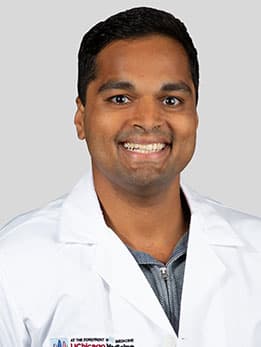Pediatric Brain Tumors: Types, Symptoms and Treatment

A Multidisciplinary Team to Support You and Your Child
Families of children with brain and spinal cord tumors face great challenges, but finding comprehensive, compassionate care shouldn't be one of them. Our Pediatric Brain and Spinal Cord Tumor Program at the University of Chicago Medicine Comer Children’s Hospital provides many choices of diagnostic, treatment, rehabilitation and support services so that your child has the best chance for a cure, as well as the best possible quality of life.
Pediatric experts from a wide range of specialties including neuro-oncology, neurosurgery, endocrinology, ophthalmology, genetics and occupational therapy are ready to be part of your child's team. Together, they will work hard to understand your child’s case and develop a personalized treatment plan designed to achieve the best outcomes.
When it comes to your child’s treatment, we know every moment matters.
Take the first step to connect with the pediatric brain tumor specialist who will lead your child's care team.
Meet our Pediatric Brain Tumor Experts
For appointments or referrals:
Call us at 773-702-6169
Symptoms of Brain Tumors in Children
The symptoms a child develops depend on where the tumor is located within the brain.
These symptoms may include:
- Severe or persistent headaches
- Nausea and vomiting
- Seizures
- Difficulty walking
- Personality changes
- Drowsiness
Without treatment, a severe brain tumor can also cause:
- An unusually large head due to swelling (macrocephaly)
- Coma
- Death
Pediatric Brain Tumor Diagnosis
Our experts at Comer Children’s specialize in diagnosing and treating a wide range of pediatric brain and spinal cord tumors in children. From Chicago to the suburbs and beyond, families and referring physicians trust the skill and experience of our specialists. We understand that each child is unique and requires a comprehensive care plan that meets their specific needs.
On your first visit, our team will start by taking your child's medical history and completing a thorough physical examination. We may also recommend some of the following tests to confirm or rule out the presence of a brain or spinal cord tumor:
- Computed tomography (CT), a non-invasive imaging procedure that uses X-rays to study the brain
- Magnetic resonance imaging (MRI), a tool that uses magnetic fields and computers to create images of the brain and spine
- Magnetic resonance spectroscopy (MRS), which analyzes the biochemical makeup of a tumor
- Position emission tomography (PET), which monitors cell activity to detect cancer
- Surgical biopsy, which allows doctors to closely examine the tumor tissue
If your child has been diagnosed with a brain tumor at another hospital, we offer second opinions to help put your mind at ease. Our expert team is available to answer your questions, so you can move forward with confidence in your child’s treatment plan.
Types of Pediatric Brain Tumors
Many different types of brain and spinal cord tumors can affect children. These tumors can be cancerous (malignant) or noncancerous (benign). Although benign brain tumors are not cancerous, they may cause serious issues and can be difficult to treat. Malignant brain tumors have additional challenges, as the cancer may spread to other parts of the brain and other parts of the central nervous system.
The most common types of pediatric brain and spinal cord tumors are listed below. Our specialists have expertise in diagnosing and treating a wide range of tumors, including those not listed here.
- Atypical teratoid rhabdoid tumors (ATRT)
- Central nervous system (CNS) embryonal tumors
- Choroid plexus tumors
- Craniopharyngioma
- Diffuse intrinsic pontine glioma (DIPG)/Diffuse midline glioma (DMG)
- Ependymoma
- Germ cell tumors
- High-grade glioma (such as glioblastoma multiforme)
- Low-grade glioma (LGG)
- Medulloblastoma
- Meningioma
- Pineal and pituitary tumors
- Schwannoma
- Subependymal giant cell astrocytoma (SEGA)
- Tumors associated with neurofibromatosis
- Vascular anomalies
Your child’s treatment will depend on the type of brain tumor they have. Some tumors, like low-grade gliomas, are curable with the right treatment plan. Others like DIPGs and DMGs may not be curable, but advanced treatments available at Comer Children’s may help your child live a longer and more comfortable life.
“We provide excellent, comprehensive care, working as a multidisciplinary team with our patients and their families, while being open to pushing the needle and not settling on the norm.”

Pediatric Brain Tumor Treatments
The goal of treatment is to remove or destroy as much of your child's brain tumor as possible while protecting the healthy tissue around it. Depending on the location and severity of the tumor, as well as your child's age and overall health, we may recommend surgery, targeted therapy, chemotherapy, radiation or a combination of treatments. Our multidisciplinary team will work with you to find the best solution.
When your child’s tumor is in part of the brain where it is safe to remove, surgery often is a first-line treatment. We understand that surgery can be frightening, and we provide support to help you and your child through the process. Our skilled pediatric neurosurgeons offer several minimally invasive surgeries that reduce pain and help children recover faster than traditional procedures. State-of-the-art computer navigation systems can help doctors "map" the brain and spine to better pinpoint the location of the tumor. Learn more about surgery for pediatric brain and spinal cord tumors.
New targeted therapies are offering hope for some children with brain tumors. Because researchers have gained a better understanding of the genetic makeup of these tumors over the past decade, we can now offer more treatments that can stop certain tumors from growing. This includes low-grade gliomas related to neurofibromatosis type 1 (NF1), as well as low-grade gliomas not caused by NF1. Targeted therapies may also be an option for those with subependymal giant cell astrocytomas (SEGAs), which are benign brain tumors common in people with tuberous sclerosis.
For some aggressive types of brain tumors that haven’t responded to other radiation treatments, we also offer referrals to proton therapy. This type of radiation therapy uses highly precise beams of positively charged particles (protons) to destroy cancer cells.
Chemotherapy can play a major role in your child's treatment plan. We have expertise in delivering conventional doses of chemotherapy, high dose chemotherapy with autologous stem cell rescue, and more advanced or targeted approaches. Our experts will determine the optimal therapy for the course of your child's disease. Learn more about chemotherapy.
We use advanced radiation technologies that optimally target tumors while protecting healthy brain tissue. Three-dimensional conformal radiotherapy (3D-CRT), intensity-modulated radiation therapy (IMRT), and image-guided radiation therapy (IGRT) are routinely used to accomplish these goals. In addition, stereotactic radiosurgery is considered in the treatment of select brain tumors in children. These types of radiotherapy utilize the most advanced computer-aided planning and imaging techniques, in order to maximize cure rates and minimize side effects. Learn more about pediatric radiation oncology.
Rehabilitation may also play a key role in your child’s treatment. Our team of physical therapists, occupational therapists and speech therapists will work with your child as needed to help maintain or regain skills and function that may be reduced during illness. Learn more about pediatric therapy services.
Why Choose Comer Children's for Pediatric Brain Tumor Treatment?
We understand that children with brain and spinal cord tumors need to be treated differently than adults, and we can provide the support they need along with the most advanced therapies.
There have been tremendous advances in brain tumor care in recent years. Our team is committed to furthering research in this area. We work to improve current treatments and identify options for brain and spinal cord tumors that do not respond to conventional therapies.
We collaborate with research groups around the country to give patients access to the most promising treatments available in clinical trials. Some of these research groups include the National Cancer Institute, the Children's Oncology Group and the Neurofibromatosis Research Program.
Children coping with challenging diagnoses often have ongoing medical, emotional, social and developmental needs. Our doctors, nurses, social workers and child life specialists recognize these issues and can provide your family with resources and tools to help you cope throughout your child's treatment journey.
Children who have survived cancer may face other health issues as they grow older. To meet these challenges, Comer Children’s created the Childhood Cancer Survivors Center. This unique center helps young patients address some of the social and emotional concerns they may have as cancer survivors.
In addition, Comer Children's is home to the Pediatric Familial Cancer Clinic. The goal of this program is to help children and their families who may have an increased risk of cancer. Our experts perform risk assessments, genetic counseling and care coordination to reduce any risk.
We provide expert second opinions on the diagnosis or treatment plan for your child's tumor.
We provide many resources to help children and their families live with cancer, including:
Request an Appointment
We are currently experiencing a high volume of inquiries, leading to delayed response times. For faster assistance, please call 773-702-6169 to schedule your appointment.
If you have symptoms of an urgent nature, please call your doctor or go to the emergency room immediately.
For Referring Physicians
To refer a pediatric patient for cancer care, please call UCM Physician Connect at 1-800-824-2282.
* Indicates required field
